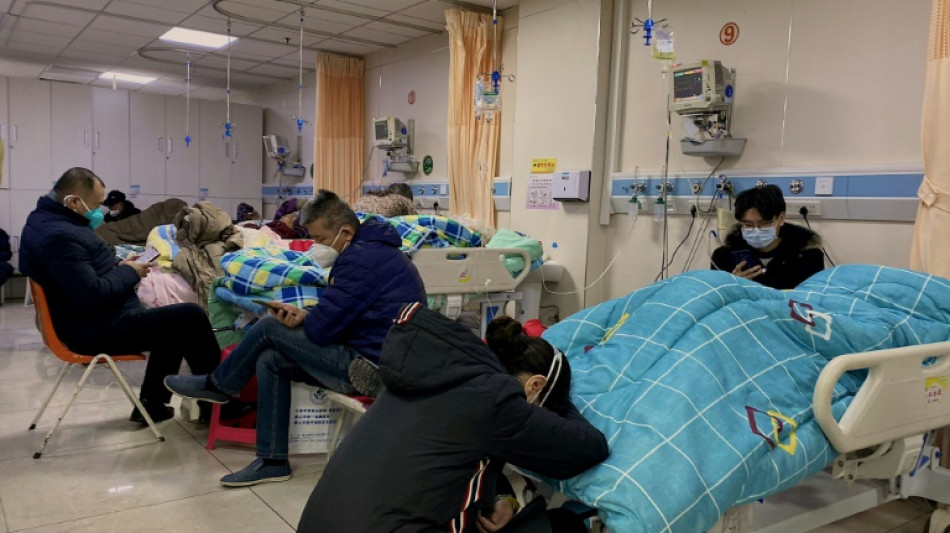
-
 Deadly storm sparks floods in Spain, disrupts Portugal vote
Deadly storm sparks floods in Spain, disrupts Portugal vote
-
Ukrainian flag bearer proud to show his country is still standing

-
 Carney scraps Canada EV sales mandate
Carney scraps Canada EV sales mandate
-
Morocco says evacuated 140,000 people due to severe weather

-
 Spurs boss Frank says Romero outburst 'dealt with internally'
Spurs boss Frank says Romero outburst 'dealt with internally'
-
Giannis suitors make deals as NBA trade deadline nears

-
 Carrick stresses significance of Munich air disaster to Man Utd history
Carrick stresses significance of Munich air disaster to Man Utd history
-
Record January window for transfers despite drop in spending

-
 'Burned inside their houses': Nigerians recount horror of massacre
'Burned inside their houses': Nigerians recount horror of massacre
-
Iran, US prepare for Oman talks after deadly protest crackdown

-
 Winter Olympics opening ceremony nears as virus disrupts ice hockey
Winter Olympics opening ceremony nears as virus disrupts ice hockey
-
Mining giant Rio Tinto abandons Glencore merger bid

-
 Davos forum opens probe into CEO Brende's Epstein links
Davos forum opens probe into CEO Brende's Epstein links
-
ECB warns of stronger euro impact, holds rates

-
 Famine spreading in Sudan's Darfur, warn UN-backed experts
Famine spreading in Sudan's Darfur, warn UN-backed experts
-
Lights back on in eastern Cuba after widespread blackout

-
 Russia, US agree to resume military contacts at Ukraine talks
Russia, US agree to resume military contacts at Ukraine talks
-
Greece aims to cut queues at ancient sites with new portal

-
 No time frame to get Palmer in 'perfect' shape - Rosenior
No time frame to get Palmer in 'perfect' shape - Rosenior
-
Stocks fall as tech valuation fears stoke volatility

-
 US Olympic body backs LA28 leadership amid Wasserman scandal
US Olympic body backs LA28 leadership amid Wasserman scandal
-
Gnabry extends Bayern Munich deal until 2028

-
 England captain Stokes suffers facial injury after being hit by ball
England captain Stokes suffers facial injury after being hit by ball
-
Italy captain Lamaro amongst trio set for 50th caps against Scotland

-
 Piastri plays down McLaren rivalry with champion Norris
Piastri plays down McLaren rivalry with champion Norris
-
ECB holds interest rates as strong euro causes jitters

-
 Spain, Portugal face floods and chaos after deadly new storm
Spain, Portugal face floods and chaos after deadly new storm
-
EU close to sealing trade deal with Australia

-
 German Cup final to stay in Berlin until 2030
German Cup final to stay in Berlin until 2030
-
What does Iran want from talks with the US?

-
 Taming the lion: Olympians take on Bormio's terrifying Stelvio piste
Taming the lion: Olympians take on Bormio's terrifying Stelvio piste
-
Wind turbine maker Vestas sees record revenue in 2025

-
 Italy's Casse tops second Olympic downhill training
Italy's Casse tops second Olympic downhill training
-
Anti-doping boss 'uncomfortable' with Valieva's coach at Olympics

-
 Bitcoin under $70,000 for first time since Trump's election
Bitcoin under $70,000 for first time since Trump's election
-
'I am sorry,' embattled UK PM tells Epstein victims

-
 England's Brook predicts record 300-plus scores at T20 World Cup
England's Brook predicts record 300-plus scores at T20 World Cup
-
Ukraine, Russia swap prisoners, US says 'work remains' to end war

-
 Wales' Rees-Zammit at full-back for Six Nations return against England
Wales' Rees-Zammit at full-back for Six Nations return against England
-
Sad horses and Draco Malfoy: China's unexpected Lunar New Year trends

-
 Hong Kong students dissolve pro-democracy group under 'severe' pressure
Hong Kong students dissolve pro-democracy group under 'severe' pressure
-
Germany claws back 59 mn euros from Amazon over price controls

-
 Germany claws back 70 mn euros from Amazon over price controls
Germany claws back 70 mn euros from Amazon over price controls
-
VW and Stellantis urge help to keep carmaking in Europe

-
 Stock markets drop amid tech concerns before rate calls
Stock markets drop amid tech concerns before rate calls
-
BBVA posts record profit after failed Sabadell takeover

-
 UN human rights agency in 'survival mode': chief
UN human rights agency in 'survival mode': chief
-
Greenpeace slams fossil fuel sponsors for Winter Olympics

-
 Greenpeace slams fossel fuel sponsors for Winter Olympics
Greenpeace slams fossel fuel sponsors for Winter Olympics
-
Kinghorn, Van der Merwe dropped by Scotland for Six Nations opener

| CMSC | -0.17% | 23.48 | $ | |
| SCS | 0.12% | 16.14 | $ | |
| NGG | -0.71% | 87.17 | $ | |
| RBGPF | 0.12% | 82.5 | $ | |
| RYCEF | -0.36% | 16.62 | $ | |
| RIO | -4.49% | 92.335 | $ | |
| CMSD | 0.21% | 23.92 | $ | |
| GSK | 3.44% | 59.27 | $ | |
| BTI | 0.61% | 62.01 | $ | |
| BCE | -4.2% | 25.279 | $ | |
| RELX | 0.73% | 30 | $ | |
| BCC | -2.52% | 88.01 | $ | |
| VOD | -6.98% | 14.685 | $ | |
| AZN | 0.78% | 188.92 | $ | |
| BP | -2.42% | 38.275 | $ | |
| JRI | 0.3% | 13.19 | $ |

Soaring Covid cases shine light on China's healthcare gap
Understaffed and underfunded clinics stand half-empty in parts of the Chinese countryside even as hospitals in major cities heave under an unprecedented Covid wave -- an illustration of the stark disparities in the country's healthcare system.
Visits by AFP journalists in the past two weeks have revealed sharp differences in demand for urban and rural hospitals in parts of northern China as many in the countryside head to big cities for a quality of care they simply can't get closer to home.
In one of the world's most unequal economies, China's centralised healthcare system drives money and resources towards urban hospitals at the expense of rural ones, a disparity that has become all the more intense as cases surge.
In the capital Beijing and the northern megacity of Tianjin, emergency wards have been so overwhelmed that dozens of mostly elderly patients have been accommodated on gurneys in public areas.
Crammed shoulder to shoulder and gasping for breath, many were hooked up to intravenous drips or oxygen tanks while machines monitored their vital signs. A few appeared unconscious or unresponsive.
Yet in the neglected rural town of Xin'an, the sparsely equipped local hospital was operating at well below full capacity.
In a poorly heated room near reception, around half a dozen elderly people huddled in thick overcoats, drips protruding from their arms.
But most of the seats were unoccupied, and the pressure on staff appeared far lower than their municipal counterparts.
- 'Lack of progress' -
"What we are seeing in rural China epitomises the lack of progress in China's healthcare reform," said Yanzhong Huang, senior fellow for global health at the Council of Foreign Relations, a nonpartisan US think tank.
"People dissatisfied with the poor quality of rural healthcare will bypass (local providers) to seek care in urban hospitals."
As the initial wave starts to ebb, the pressure on some facilities may be receding -- even as the seriously sick continue to flock to municipal institutions.
Many rural residents, meanwhile, struggle for nearby access to doctors and medicines, and public health literacy is often patchy.
A local shopkeeper in Xin'an said a Covid outbreak had swept through the settlement of around 30,000 people in December, but "the worst of it has passed".
And hospital staff and local residents there said those requiring treatment for severe illness usually made the 90-minute journey up the highway to Tianjin or pushed on to Baoding, a city some 200 kilometres away where a recent outbreak overwhelmed hospitals.
Medical services in mid-size municipalities also appear to be less stretched than in China's megacities.
In Tangshan -- a smaller industrial city of 7.7 million people -- the scene was calmer than that in Tianjin about two hours away.
Around two dozen patients of advanced age filled the resuscitation ward of a central hospital, with one nurse saying they had "all tested positive" for Covid.
Only three or four patients occupied makeshift beds in the corridors outside.
- Far from over -
Chinese authorities have said in recent days that the first wave of infections has hit a peak in cities including Beijing and Tianjin.
But the end is far from near, with officials warning of a multi-pronged outbreak in the coming weeks as city workers return to their rural hometowns during the winter travel season.
"To some extent, rural patients may have put extra strains on urban healthcare institutes," said Xi Chen, an associate professor at the Yale School of Public Health.
"However, unlike in urban areas, this wave of the Omicron outbreak has not reached its peak in rural China," he added
"Things may get significantly worse as migrants start to return to rural communities."
O.Mousa--SF-PST




